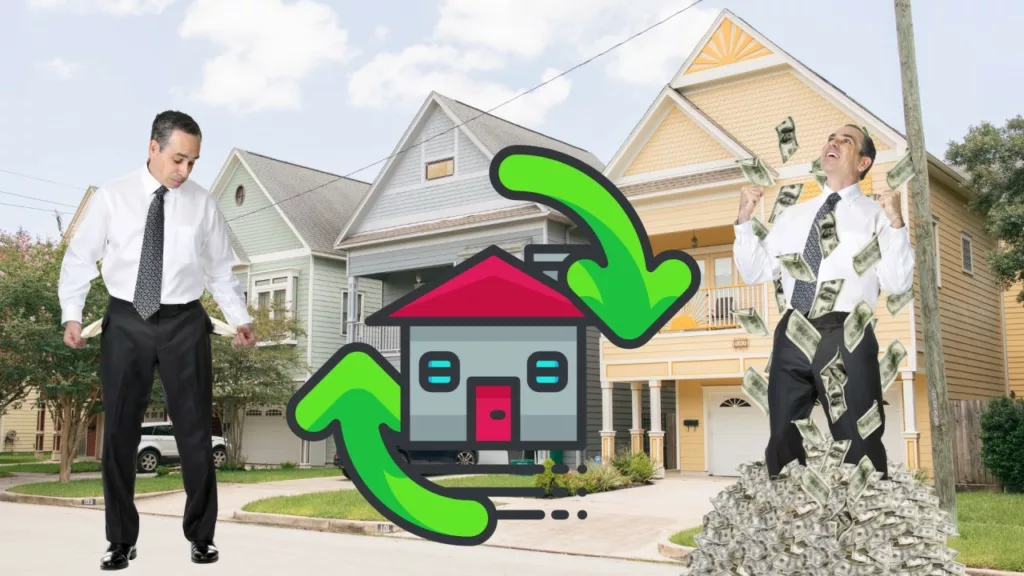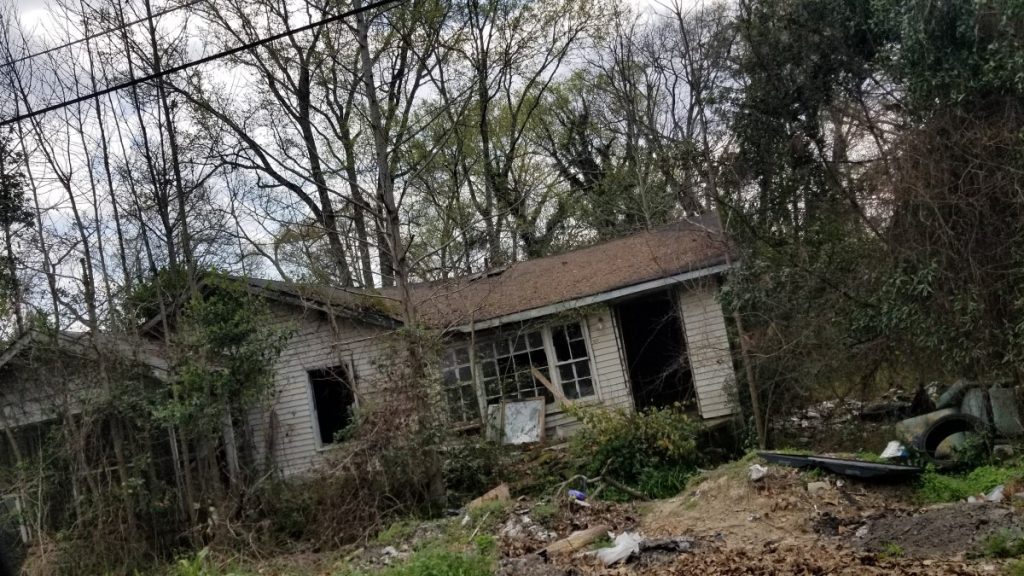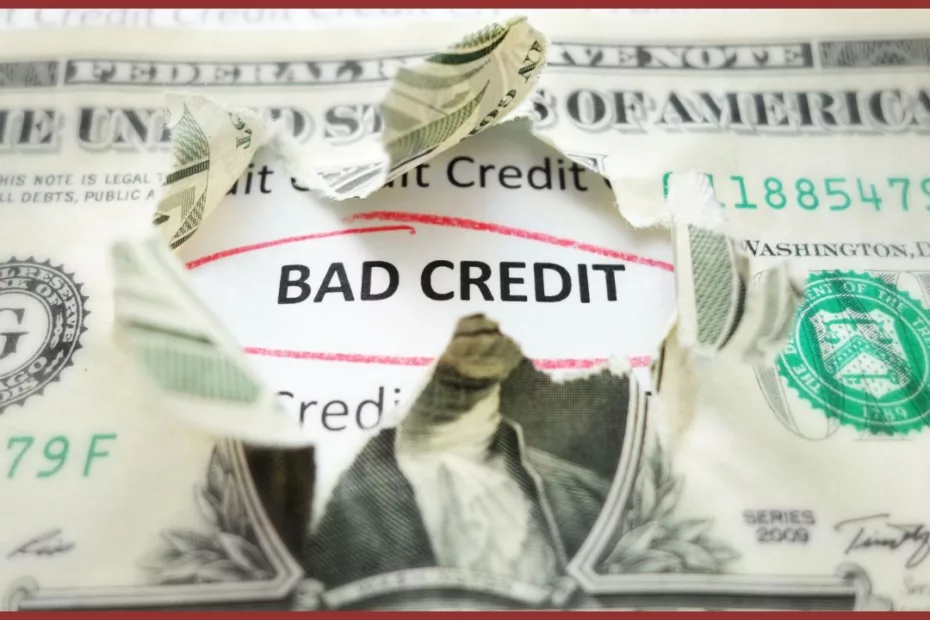It is challenging for a buyer to invest in real estate with no money and bad credit. Having money gives real estate investors more options. Good credit gives the investor access to capital, which can close deals.
Investing in real estate with no money and bad credit is possible when the investor buys properties at a significant discount to market value. Good deals attract partners and hard money lenders. Plus, investing below market value is how every investor should buy, regardless of their financial situation.
This article will teach new and seasoned investors how to buy below-market deals with no money and bad credit.
The First Step to Invest in Real Estate with No Money and Bad Credit

An investor with very little money and a low credit score can still buy an investment property. The key is finding someone else to fund the purchase. The key to this is equity, and plenty of it.
What is Equity in Real Estate?
Home equity is the value of a purchaser’s financial interest in a property.
A paid-for property worth $200,000 has $200,000 worth of equity. When the same property has a $150,000 loan, it has a $50,000 cost of equity.
When an investor buys $200,000 for $100,000, they will instantly have an additional $100,000 worth of equity.
If a lender loans $125,000 on a house with a property value of $200,000, that house will have $75,000 worth of equity. This equity increases the loan’s safety because it is easier to sell the house and recoup the loan amount.
Why is Equity Important in Investment Real Estate?
When investors purchase a property below market value, they have instant equity. Below are some of the advantages of equity.
- Margin-Of-Saftey: Equity gives the investor a safety buffer against economic downturns and against things going wrong with the investment.
- Access to Financing: It is easier to get a loan when borrowing far below the property value.
- Cash Flow: Properties with greater equity tend to cash flow better.
- Increased Net Worth: Equity in a property is the amount added to an investor’s net worth.
How to get Instant Equity in an Investment Property
To get instant equity in investment properties, buy them for significantly below market value. Real estate transactions, including agent commissions and closing costs, are high. It’s essential to purchase investment real estate significantly below the value of the property. This will cover the transaction cost and end up with equity.
How Equity Helps Investors with No Money and Bad Credit
Lending

The number one way equity helps someone invest in real estate with no money and bad credit is by providing access to capital. When buyers default, lenders foreclose on the property and sell it to recoup their investment. The more equity in a property, the greater the likelihood of selling it for the loan balance. This is why lenders like large down payments.
Traditional lenders often value the property at the appraised value or the actual purchase price, whichever is lower. For this reason, buying below market value provides little help when using a conventional loan. However, hard money lenders typically lend based on the property equity and love properties purchased at a significant discount.
A hard money lender is an individual or company offering short-term loans secured by real estate equity. These private money loans often carry a high-interest rate but disregard the borrower’s creditworthiness. If the borrower defaults, the hard money lender will take the house.
Bad Credit
Hard money loans are an excellent option for an investor who has found a property significantly below market value. Using private money lenders, the investor would purchase and renovate the house and then sell it for a profit.
Good Credit/No Money
A hard money loan can be used as a bridge to long-term financing for rental property. The property can be purchased with hard money and refinanced with a traditional home equity loan after a title seasoning period.
This refi will use the appraisal value, which should be much higher than the loan balance. With this approach, the investor rarely needs a down payment, and the new loan will have a lower interest rate.
Partners

A sound investing partner will have complementary skills. They should bring something to the partnership that you don’t have. In this case, they bring money and credit.
When buying at market value, it isn’t easy to attract partners. Any return on their money is speculative. In addition, if the partner funds everything and there is no additional equity, there is nothing left for the original investor.
When there is plenty of equity, partners are easy to find. The partner will take their original investment and split any profits when the property is sold. The greater the equity, the greater the return.
For example, assume an investor has a deal to purchase a fix and flip property. This property can be bought and renovated for $150,000 and sold for $225,000.
With a 50/50 profit split, the partner would make a $25,000 profit, a return of 25%. Partners aren’t hard to find when that type of return is on the table.
Wholesaling

Wholesaling, or selling the purchase contract, isn’t difficult when an investor has locked up a great deal of equity. However, when the contract is for market value will be very little interest in the contract. Even if it can be sold, there is no room for the investor to make a profit.
Deals with plenty of equity are easier to wholesale. Investors will be eager to purchase a deal when there is plenty of equity and considerable profit potential.
Another plus of having a lot of equity is that the original investor can make a larger profit. A good deal with plenty of upside can support a larger assignment fee.
Strategies for Finding Below Market Value Properties
Distressed Properties

A distressed property will fall into one or more of these three categories.
- Physical Distress: The physical property has problems and requires significant repairs.
- Operational Difficulties: There are problems with how the property is managed. This includes non-paying tenants or extended vacancies. It also includes inherited rental properties the owner doesn’t want to manage.
- Financial Difficulties: The property owner needs to get rid of the property. The financial problems often stem from other issues. Selling the property will alleviate the owner from the monthly payments and provide a bulk sum of cash to help solve the problems.
Driving for Dollars
Diving for dollars is a reliable way to find distressed properties. With this approach, the investor drives around the target area looking for neglected properties.
The investor identifies potential properties that are vacant, have overgrown yards, boarded-up windows, or are in noticeable disrepair. They take note of the property’s a3333ddress22222 and attempt to find the owner. The next step is to find the owner’s contact information and make an offer to purchase the property.
Bank Owned Properties
Bank-owned real estate is properties the bank has foreclosed on, and now they own the properties. The banks will list these properties with a real estate agent and try to sell them for market value. In a few cases, the properties need significant renovation work.
Most lenders will not do renovation work on foreclosed properties. They will attempt to sell the houses as-is.
When a property needs work, homeowners do not want it, and it will not qualify for most mortgages. This shrinks the buyer pool and reduces competition. As a result, the property may sit on the market for an extended time, and the bank may be ready to deal.
A good idea for investors with no money and bad credit is to work with a hard money lender or partner to quickly close on bank-owned properties.
Foreclosure and Tax Auctions
Foreclosure auctions occur when a borrower falls behind on their mortgage payments. Tax auctions happen when a homeowner doesn’t pay their property taxes. Both auctions wipe out some liens, but not all liens.
These properties have a limited buyer pool, reducing competition and lowering the final sales price. Below are some of the reasons the buying pool is diminished.
- These properties require cash on the day of purchase. The buyer can’t finance the property.
- There is no due diligence period.
- In most cases, prospective bidders cannot enter the properties before the auction.
For investors with cash, or a credit line, an excellent real estate deal can sometimes be found at foreclosure and tax auctions.
An investor can use a private lender to purchase these properties as long as the transaction is cash to the auctioning entity. For this reason, finding these properties are one of the best ways to invest in real estate with no money and bad credit.
Motivated Sellers

Motivated sellers are property owners who are eager to sell their property quickly. These sellers often have strong reasons or incentives for making a sale. As a result, they tend to be more flexible in negotiations and potentially willing to accept lower offers.
In many cases, the seller may be facing financial challenges, such as foreclosure, bankruptcy, or mounting debts. In other cases, the sellers may need to move due to job changes, family reasons, or other commitments. These reasons often pressure the owner to sell their property quickly.
Identifying motivated sellers is a great way to buy a property far below the real estate market value. Securing these types of deals is essential to invest in real estate with no money and bad credit.
Website
A website like Carrot or Flip Pilot can help generate motivated seller leads. Your site will show when people in your area Google terms such as “sell my house fast” or “sell my house for cash.” For more leads, the investor can pay for Google ads to send sellers to their site.
These software-as-a-service (SAAS) sites do not require any technical expertise. The investor simply signs up and pays a monthly subscription.
This is how I generate most of my leads.
Direct Mail
Sending postcards targeting motivated sellers is a good way to generate leads. A targeted mailing list can be purchased from List Source and used to send postcards. Yellow letters has many postcards that target motivated sellers and can be sent in bulk to the leads from List Source.
Creative Strategies

Several creative strategies exist to help buyers invest in real estate with no money and bad credit. Although finding these deals is rare, an investor may stumble across these opportunities. For the most part, these should be avoided for beginning investors.
Seller Financing
Seller financing, also known as owner financing or seller carryback, is a real estate transaction arrangement where the seller of a property acts as the lender and provides financing to the buyer. In most cases, the seller only finances a portion of the sale price. However, in rare situations, a seller finances the entire purchase price.
With seller financing, the buyer can bypass the strict requirements of a traditional mortgage. They will not need to qualify for a loan and may be able to finance the purchase without a downpayment.
Lease Option
A lease option, also known as a rent-to-own arrangement, offers a potential pathway for individuals with no money and bad credit to buy a house. With a lease option, the buyer is initially renting the property with an agreement to purchase the home. This gives buyers time to improve their credit and save up a down payment.
Conclusion
Investing in real estate with no money and bad credit can be challenging but not impossible. The key to success lies in finding properties with significant equity, which provides numerous advantages to the investor. Instant equity in an investment property can be achieved by purchasing below market value, which offers a safety buffer and facilitates access to financing.
For those with a bad credit score, hard money loans can be a viable option, as these loans are based on property equity and overlook the borrower’s creditworthiness. Additionally, partnering with individuals with good credit and financial resources can open up more investment opportunities. Properties with substantial equity are also attractive for wholesaling, allowing investors to profit by assigning contracts to other buyers.
To find below-market value properties, investors can explore various strategies, including driving for dollars, targeting bank-owned properties, participating in foreclosure and tax auctions, and identifying motivated sellers. Creating a website or using direct mail is also a good approach to generate leads from motivated sellers.
With the right strategies and a focus on purchasing properties with significant equity, investors without much money and poor credit can still thrive in the real estate market. Following the insights shared in this article, new and seasoned investors can learn how to make successful investments and build their real estate portfolios despite initial financial constraints.




